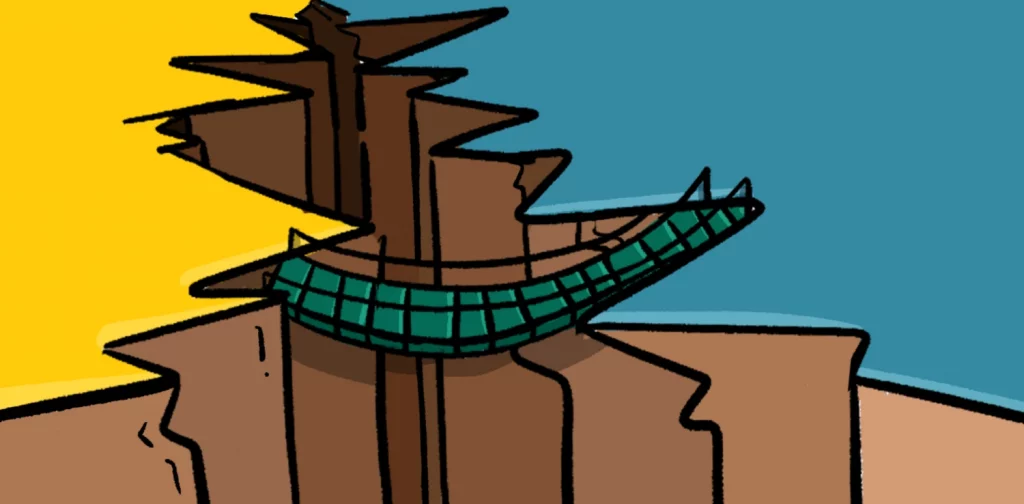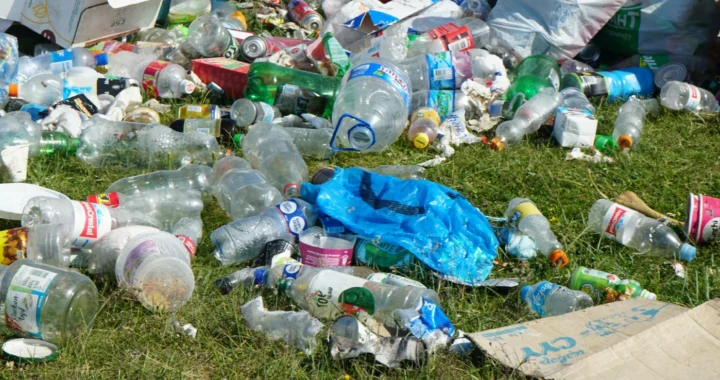The Great Green Divide, Call for Global Unity

Illustration by Irhan Prabasukma.
In our complex global society, the Great Green Divide is not merely a metaphorical concept but a stark and tangible reality for many. It starkly separates those who suffer from environmental degradation from those who benefit from nature’s resources. Addressing the Great Green Divide stands as one of the most urgent challenges of our time.
The Great Green Divide, A Global Inequality
The empirical evidence of the Great Green Divide presents a striking illustration of global inequality. Take, for example, the global South, where regions like Africa contribute only a small fraction of greenhouse gas emissions, accounting for roughly two to three percent of global emissions. Nevertheless, these areas disproportionately endure the harsh consequences of climate change. The Intergovernmental Panel on Climate Change (IPCC) has issued warnings of increasingly frequent and severe natural disasters in these regions, which pose significant threats to agriculture, livelihoods, and food security.
Developing countries, such as Indonesia with its large population and diverse ecosystems, reflect these global issues. Indonesia faces challenges such as deforestation, urban air pollution, and coral reef degradation, which underscore the environmental consequences of rapid economic growth. In Indonesia’s case, the country’s efforts to promote renewable energy and reduce dependence on fossil fuels are proactive measures aimed at mitigating the impact of the Great Green Divide.
Beyond Environmental Impacts
However, the societal and health implications of this divide extend beyond environmental degradation. Communities in pollution-heavy areas face increased health risks, with about 9 million premature deaths annually attributed to pollution, as reported by the Lancet Commission on Pollution and Health. This crisis predominantly affects low- and middle-income countries, fueling cycles of poverty, conflict, and social unrest.
The Great Green Divide also encompasses disparities in access to technology and sustainable resources. Wealthier nations with the capacity to invest in renewable energy and sustainable practices unintentionally widen this gap. In contrast, developing countries often rely on outdated and environmentally harmful technologies due to limited resources.
This situation highlights a moral and historical responsibility for developed nations. These countries, which have historically played a significant role in global environmental degradation and pollution, have an obligation to provide support and compensation to less developed nations as they transition toward sustainability. This compensation goes beyond mere financial aid and encompasses technology transfer, capacity building, and fair resource sharing.
The economic growth of many developed nations has often come at the expense of exploiting natural resources, disproportionately impacting less developed countries. This paradox places the environmental burden on those who are least responsible for it. Addressing this injustice requires a fundamental shift in global economic policies, with a focus on prioritizing environmental and social well-being over mere economic growth.
Global Cooperation and Technology for Solutions
Addressing the Great Green Divide necessitates creative and economically viable solutions. The United Nations Environment Programme (UNEP) emphasizes that for every dollar invested in ecological restoration, there is a nine-fold return, resulting in advantages like improved health and reduced disaster-related losses. Moreover, nature-friendly solutions have the potential to generate 395 million new jobs by 2030.
Global cooperation is essential in this effort. Rethinking economic measurements and going beyond Gross Domestic Product (GDP) to incorporate environmental and social wellbeing can provide a more comprehensive view of a country’s progress. This shift allows for a more holistic perspective on development, considering not only economic factors but also the environment and social aspects.
Technological advancements indeed provide solutions to address environmental challenges. Affordable renewable energy technologies can play a crucial role in helping developing countries transition to cleaner and more sustainable energy sources, reducing their reliance on fossil fuels and lowering greenhouse gas emissions.
In addition, innovations in agricultural technology have the potential to mitigate the impact of climate change on food security, especially in vulnerable regions. These innovations can improve crop yields, enhance water management, and promote sustainable agricultural practices, ultimately contributing to greater food resilience in the face of changing environmental conditions. Embracing such technological solutions is essential in our efforts to bridge the Great Green Divide and create a more sustainable future.
Fairness, Justice, and Sustainability
The Great Green Divide is a significant challenge. It requires our collective wisdom, creativity, and action. Informed by empirical evidence, our approach must integrate ethical considerations, environmental justice, and economic reform. Following Gandhi’s wisdom, we must manage Earth’s resources with fairness, justice, and sustainability in mind.
In our pursuit of bridging this divide, we envision and actively work toward a world characterized by shared prosperity, environmental justice, and sustainability. In this world, sustainable development goes beyond policy to become a global ethos. Technologies are harnessed not only for economic gain but also to improve environmental quality and ensure equitable distribution of resources.
The significant Great Green Divide represents an opportunity for substantial transformation. Embracing principles of sustainability, equity, and innovation can turn this divide into a catalyst for growth, harmony, and a more balanced coexistence with nature. This journey may demand patience, unwavering perseverance, and the collective determination of humanity, but it is undeniably within our reach. Every step taken to bridge the Great Green Divide brings us closer to a world where the gifts of nature are shared fairly, and its challenges are met with fairness and foresight, paving the way for a more sustainable and harmonious future.
Editor: Kresentia Madina & Nazalea Kusuma

Co-create positive impact for people and the planet.
Amidst today’s increasingly complex global challenges, equipping yourself, team, and communities with interdisciplinary and cross-sectoral insights on sustainability-related issues and sustainable development is no longer optional — it is a strategic necessity to stay ahead and stay relevant.
Setyo Budiantoro
Budi is the Manager of Economic Development Pillar at the National SDGs Secretariat of BAPPENAS and a part of Green Network Asia's Advisory Network. He is also active as a Sustainable Development Strategist at The Prakarsa, MIT Sloan IDEAS Fellow, Advisory Committee Member at Fair Finance Asia, and SDGs–ESG Expert at the Indonesian ESG Professional Association (IEPA).


 Finally Enforced: Understanding the UN High Seas Treaty
Finally Enforced: Understanding the UN High Seas Treaty  Risks and Opportunities of Submarine Communication Cables for Sustainable Development
Risks and Opportunities of Submarine Communication Cables for Sustainable Development  Rising Attacks and Violence Against Land and Environmental Defenders
Rising Attacks and Violence Against Land and Environmental Defenders  Unveiling Potential Technological Risks amid Global Crises
Unveiling Potential Technological Risks amid Global Crises  Waste-to-Methanol, a Potential Sustainable Solution for Waste and Energy
Waste-to-Methanol, a Potential Sustainable Solution for Waste and Energy  In Peru, Stingless Bees Are Granted Legal Rights
In Peru, Stingless Bees Are Granted Legal Rights